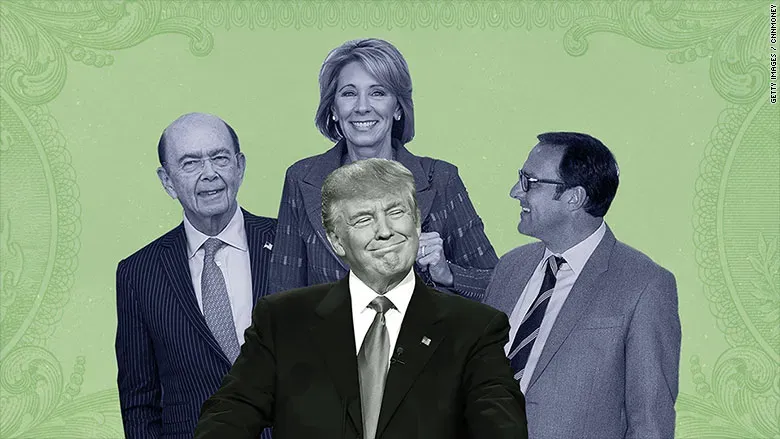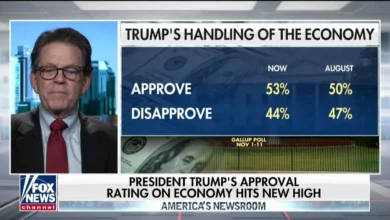Trump Billionaires’ Impact on the Economy in 2025

The Trump Billionaires, a cadre of extremely wealthy individuals surrounding the former president, have made headlines with their bold declarations about the economy and the everyday realities of Americans. With figures such as Treasury Secretary Scott Bessent and Commerce Secretary Howard Lutnick at the helm, their remarks often stir controversy, highlighting a stark contrast between their financial comfort and the struggles of the average citizen. Comments about retirement funds and Social Security resonate particularly deeply, with billionaires offering perspectives that seem oddly disconnected from the lives of ordinary Americans. As they navigate the complexities of the Trump economy, many question whether these individuals truly understand the implications of their policies on the lower and middle classes. Insights from prominent billionaires, including Elon Musk’s controversial stance on Social Security, reinforce concerns about the influence of the uber-wealthy in managing the economic landscape.
Known for their immense wealth and significant influence, the billionaires associated with Trump have become pivotal figures in discussions about America’s economic direction. This elite group, comprising powerful individuals like Scott Bessent and Howard Lutnick, frequently shares opinions that reflect their unique vantage point, which often appears at odds with the average American’s experiences. Their statements regarding market fluctuations and benefits such as Social Security provide a glimpse into how those managing the economy view critical issues. Many observers argue that these wealthy financiers may be out of touch with the broader implications of their words, especially in light of recent economic challenges faced by everyday people. It raises an essential debate on the appropriateness of billionaire-led economic policymaking in a country where the wealth gap continues to widen.
The Impact of Trump Billionaires on the Economy
The emergence of Trump billionaires in key economic positions has significantly influenced how policies are shaped and perceived across the nation. With figures like Treasury Secretary Scott Bessent and Commerce Secretary Howard Lutnick at the helm, the relationship between wealthy elites and governmental decision-making has become increasingly pronounced. The remarks made by these billionaires often reflect a concerning disconnect from the average American’s daily financial struggles. As retirement funds fluctuate and stock market volatility continues, their confidence seems to disregard the anxieties of those less financially privileged.
Critics argue that the comments from these billionaires illustrate a troubling trend where policies benefit the wealthy while ignoring the needs of the middle class and working Americans. For instance, Howard Lutnick’s assertion about Social Security checks highlights a lack of empathy towards those reliant on government support for their livelihoods. By focusing on elitist perspectives, Trump and his billionaire cabinet raise questions about the prioritization of wealth over social welfare, leading to growing discontent among voters who feel marginalized.
Scott Bessent and Howard Lutnick: Billionaire Insights on the Economy
Scott Bessent has emphasized the importance of long-term economic perspectives, suggesting that most Americans may not be adversely affected by the day-to-day fluctuations in their retirement savings. This sentiment echoes a broader billionaire mentality that prioritizes investments over immediate financial stability for average citizens. His comments spark concern that those in positions of power may lack a comprehensive understanding of the everyday challenges faced by millions of Americans reliant on steady income and secure savings.
Conversely, Howard Lutnick’s remarks, which trivialize the significance of Social Security, have ignited outrage among social advocates. His views seem to reflect the belief that financial privilege isolates individuals from the reality that many Americans live in fear of not receiving vital social safety nets. Both executives embody a mindset that is often criticized as being out of touch, raising the question of whether billionaires like Bessent and Lutnick can genuinely comprehend the socio-economic landscape of a nation they are ostensibly managing.
Elon Musk’s Controversial Views on Social Security
Elon Musk’s provocative remarks about Social Security being a ‘Ponzi scheme’ stirred a heated debate about the viability of such safety nets in the current economic framework. As the CEO of a prominent private enterprise, Musk’s perspective reflects a growing sentiment among billionaires that government systems may not be able to sustain themselves in the long term. His comment raises important questions about the viability of social programs in the face of changing economic realities and whether billionaires should drive discourse about the future of financial security for all.
Furthermore, Musk’s recent decisions to reduce the Social Security Administration’s workforce indicate a willingness to prioritize corporate efficiency over social responsibility. This trend of viewing essential government services through a lens of profitability raises ethical concerns regarding the balance between wealth creation and social support. As influential figures, billionaires like Musk have a unique responsibility to advocate for sustainable economic models that support not just their interests but also the everyday Americans they impact profoundly.
Billionaire Influence on Public Perception and Policy
The influence of Trump billionaires on public perception is significant, particularly as their comments often dominate national discourse. Many Americans feel that statements made by figures such as Bessent and Lutnick underscore a critical disconnection between the elites and ordinary citizens. As their remarks circulate in the media, they can inadvertently shape public opinion against not just the individuals themselves but the administration they represent. This illustrates the power of billionaires to sway political narratives in ways that can either bolster or undermine the political landscape.
Moreover, when high-profile billionaires align themselves with controversial opinions, their influence can rapidly alter public sentiment toward prevailing policies. The narratives propagated by these individuals often overlook the harsh realities faced by the average American. The inconsistency between the policymakers’ wealth and the constituents’ struggles further complicates trust in government, highlighting a need for reform and a closer examination of who is truly benefiting from economic policies put in place.
The Disconnect Between Wealth and Everyday American Struggles
The remarks from billionaires within Trump’s administration reveal a disconcerting trend of disconnection from the daily hardships faced by average Americans. This disconnect stresses a larger issue about the socioeconomic chasm that exists in contemporary society, as financial elites make decisions that can drastically affect the lives of those struggling to make ends meet. Many citizens are left questioning how individuals with vast fortunes and privileges can genuinely understand the sentiment of working-class Americans.
This crucial divide between wealth and reality calls for a reevaluation of how economic policies are crafted and who is making those decisions. As a result, it’s imperative for elected officials and billionaire advisors alike to foster more inclusive discussions that consider the voices of those most impacted by economic shifts. Only through embracing a more empathetic approach can we begin to bridge this gap and cultivate a more equitable economic landscape for all Americans.
Reactions to Trump and His Billionaire Cabinet
The public’s reaction to President Trump and his billionaire cabinet is filled with skepticism and concern. Many view the president’s social media updates, especially those promoting stock buying, as catering more to the interests of the wealthy investor class rather than addressing the financial anxieties of average Americans. This disconnect exacerbates feelings of inequality and promotes a narrative suggesting that policies are being designed to uplift the rich at the expense of the general populace.
Moreover, Democratic critics who quote members of Trump’s administration often highlight these disconnections as emblematic of a larger issue: the growing divide between wealth and political power. As quotes from billionaires become sound bites in political campaigns, they reinforce the argument that billionaires managing the economy may not be in tune with the everyday struggles of citizens. This continual juxtaposition serves as fodder for political debate and may ultimately influence voter sentiment in the coming electoral cycles.
The Role of Economic Policies in Shaping Class Views
Economic policies advocated by Trump billionaires have profound implications for the general public’s perception of social class dynamics. As they wield significant influence over financial regulations and market economies, their ideologies can shape how different classes view each other. Wealthy investors might champion deregulation in a bid for profitability, while the working class reacts with apprehension, fearing that their economic security might dwindle. This dynamic underscores the importance of understanding the broader impacts of policy decisions on societal structures.
As billionaires like Bessent and Lutnick assert their economic strategies, it’s critical to assess how these policies impact the foundational elements of socioeconomic mobility. With the current administration under scrutiny for its handling of social issues, it becomes imperative for voters to critically analyze how the decisions made by the wealthy elite align or clash with their personal experiences. The growing awareness around these discrepancies could lead to a significant paradigm shift in how citizens engage with political processes moving forward.
Future Implications of Wealthy Elites in Governance
The future of American governance may increasingly involve the continued presence of wealthy elites. With billionaires like Scott Bessent and Howard Lutnick gaining prominent roles, their approaches to economic management will shape policies that influence a wide array of societal aspects. The existence of such figures raises essential questions about the intersection of wealth, power, and governance. Are these individuals equipped to govern in a manner that prioritizes the overall health of the economy while considering the needs of the less fortunate?
As we reflect on the ramifications of having billionaires in political power, it becomes essential to advocate for a governance model that embraces a wider array of voices. Engaging with diverse socioeconomic perspectives might help mitigate the disconnection felt by many. Moving forward, the challenge will be finding a balance between maintaining economic growth as spearheaded by successful entrepreneurs while ensuring that policies are equitable and representative of all citizens.
Lessons Learned from Billionaire Perspectives on the Economy
The lessons learned from the ongoing discourse surrounding Trump billionaires can inform future economic strategies. Observing the disconnect between their viewpoints and those of average citizens can highlight the critical need for policies that foster inclusiveness. As billionaires voice their opinions regarding the economy, it’s important for them to recognize the implications their perspectives may have on public sentiment and economic health.
Ultimately, fostering constructive dialogue between those in power and the constituents they serve may lead to significant breakthroughs in economic policy. Engaging with the needs of the broader population can not only enhance trust in governance but also lay a foundation for a more stable economic future. By learning from the current state of affairs, we can work toward a system where voices from all walks of life are heard, thus enriching the democratic process.
Frequently Asked Questions
What role do Trump billionaires play in managing the economy?
Trump billionaires, such as Treasury Secretary Scott Bessent and Commerce Secretary Howard Lutnick, significantly influence economic policies and decisions. Their perspectives often focus on high-level financial markets rather than everyday economic challenges faced by average Americans, showcasing a disconnect in how they manage the economy.
What did Scott Bessent say about retirement savings?
Scott Bessent, a key figure in the Trump administration, commented that Americans are not focused on ‘day-to-day fluctuations’ in their retirement savings, which highlights a perspective that may overlook the anxieties many face regarding their financial futures.
How did Howard Lutnick respond to concerns about Social Security?
Howard Lutnick remarked that his mother-in-law wouldn’t worry if her Social Security check was delayed, indicating a lack of understanding of the reliance many have on these funds, a sentiment echoed by critics of the Trump billionaires managing the economy.
What are Elon Musk’s views on Social Security?
Elon Musk has controversially referred to Social Security as a ‘Ponzi scheme’, which reflects the views of some Trump billionaires who may criticize current government programs while simultaneously influencing economic policies.
How do Trump’s billionaires view the stock market?
President Trump has encouraged stock market investments, famously stating, ‘THIS IS A GREAT TIME TO BUY!!!’, which suggests an optimistic view that may be more aligned with the interests of billionaires than with the concerns of everyday investors.
What criticisms do Democrats have about Trump’s billionaires?
Democrats criticize Trump billionaires for being disconnected from the realities faced by the average American, highlighting comments made by figures like Scott Bessent and Howard Lutnick as evidence of their lack of understanding regarding economic hardships.
How do Trump’s billionaires justify their economic policies?
Billionaires in the Trump administration, like Scott Bessent and Howard Lutnick, argue that despite current economic challenges, their policies will ultimately benefit the broader population, positioning their remarks as strategic plans that tap into market potential.
| Key Figure | Position | Key Remarks | Public Reaction |
|---|---|---|---|
| President Trump | President | “THIS IS A GREAT TIME TO BUY!!!” | Critics claim this shows disconnection from average Americans’ financial struggles. |
| Howard Lutnick | Commerce Secretary | His mother-in-law isn’t concerned about receiving Social Security checks. | Comment seen as tone-deaf to the realities faced by many. |
| Elon Musk | Tesla & SpaceX CEO | Described Social Security as a “Ponzi scheme.” | Reinforces views of indifference toward social safety nets. |
| Scott Bessent | Treasury Secretary | Claimed Americans aren’t concerned with retirement fluctuations. | Seen as a misunderstanding of public anxieties regarding savings. |
Summary
Trump Billionaires have become a focal point in the ongoing discussion about economic management and public policy under the Trump administration. The comments from key figures like President Trump and his cabinet often reflect a stark disconnect from the financial realities faced by the average American. As billionaires navigate policies that impact the economy, their remarks regarding investments, Social Security, and tariffs have drawn criticism from Democrats who argue that such perspectives highlight the risks of having ultra-wealthy individuals in leadership roles. Meanwhile, Republicans defend these statements, asserting that the wealthy bring necessary insights for future growth. In summary, the dynamics between wealth and governance are highlighted through the actions and words of Trump Billionaires, prompting broader discussions about the implications for the American populace.




